2008成都中考英语阅读填表真题含答案
2008年中考英语试题及答案
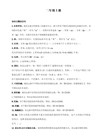
绵阳市2008年高级中等教育学校招生统一考试英语试卷本试卷分为第Ⅰ卷和第Ⅱ卷两部分,第Ⅰ卷1至8页,第Ⅱ卷9至11页。
满分150分。
考试时间100分钟。
第Ⅰ卷(选择题,共95分)1答题卡上。
考试结束,将试题卷和答题卡一并交回。
动,用橡皮擦擦干净后,再选涂其它答案,不能答在试题卷上。
第一部分:英语知识运用(共两节,满分45分)第一节:单项填空(共15小题,每小题1分,满分15分)从(A、B、C、D)四个选项中,选出可以填入空白处的最佳选项,并在答题卡上将该项涂黑。
1. Tomatoes, broccoli and _______ are vegetables.A. bananasB. potatoesC. noodlesD. eggs2. When taking the final exam he kept saying to _______, “Be careful.”A. hisB. himC. himselfD. herself3. His little sister was ill so he had to _______ her at home.A. look forB. look atC. look likeD. look after4. At first I was not sure what happened on May 12th, _____ I have never experienced such a big shake before.A. becauseB. whenC. afterD. while5. All the people have learned ______ knowledge about earthquake after the Wenchuan Earthquake.A. much moreB. more muchC. many moreD. more many6. --- Do you like the song “the Olympic Wind”?---Yes, it _________ really beautiful.A. hearsB. feelsC. soundsD. listens7. Last night there ______ only one bed and two tables left in the room.A. were B was C. had D. have8. ____ you ever ____to Singapore, a wonderful place to take a holiday?A. Have, beenB. Have, goneC. Did, goD. Do, go9.---- Did you know how the most popular drink in the world, tea, _____ 3000 years ago?----By accident.A. inventedB. has inventedC. was inventedD. is invented10. Everything ______be OK with the help of the people throughout the country though we have suffered a lot from the May 12 earthquake.A. canB. mustC. mayD. will11. ----Thank you for helping me.---- ___________.A. That’s all right.B. It’s a pleasure.C. Thank you all the same.D. Please don’t thank me.12.---- _____ were you doing when the May 12 earthquake happened?---- We were having our English lessons in the classroom.A. WhenB. HowC. WhereD. What13. Would you like to show me the place _____you lived before?A. whereB. whenC. whichD. where14. The teacher said she _____some books to the class in the afternoon.A. would bringB. will bringC. bringD. brought15 --- Do you know there?--- No. Let’s go and have a look. Maybe we can help.A. what has happenedB. has what happenedC. what are they happenedD. what they are happened第二节:完形填空(共15小题,每小题2分,满分30分)(A、B、C、D)四个选项中选出能填入相应空白处的最佳选项,并在答题卡上将该项涂黑。
【Word版】2008年四川省成都市中考英语试题附参考答案学习啊
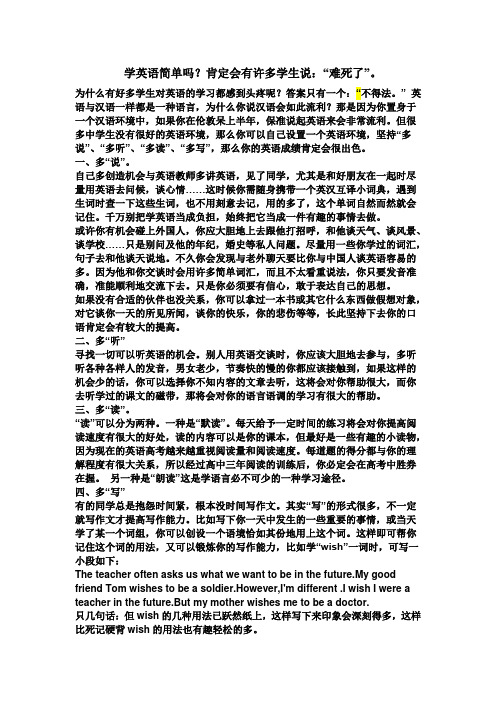
学英语简单吗?肯定会有许多学生说:“难死了”。
为什么有好多学生对英语的学习都感到头疼呢?答案只有一个:“不得法。
” 英语与汉语一样都是一种语言,为什么你说汉语会如此流利?那是因为你置身于一个汉语环境中,如果你在伦敦呆上半年,保准说起英语来会非常流利。
但很多中学生没有很好的英语环境,那么你可以自己设置一个英语环境,坚持“多说”、“多听”、“多读”、“多写”,那么你的英语成绩肯定会很出色。
一、多“说”。
自己多创造机会与英语教师多讲英语,见了同学,尤其是和好朋友在一起时尽量用英语去问候,谈心情……这时候你需随身携带一个英汉互译小词典,遇到生词时查一下这些生词,也不用刻意去记,用的多了,这个单词自然而然就会记住。
千万别把学英语当成负担,始终把它当成一件有趣的事情去做。
或许你有机会碰上外国人,你应大胆地上去跟他打招呼,和他谈天气、谈风景、谈学校……只是别问及他的年纪,婚史等私人问题。
尽量用一些你学过的词汇,句子去和他谈天说地。
不久你会发现与老外聊天要比你与中国人谈英语容易的多。
因为他和你交谈时会用许多简单词汇,而且不太看重说法,你只要发音准确,准能顺利地交流下去。
只是你必须要有信心,敢于表达自己的思想。
如果没有合适的伙伴也没关系,你可以拿过一本书或其它什么东西做假想对象,对它谈你一天的所见所闻,谈你的快乐,你的悲伤等等,长此坚持下去你的口语肯定会有较大的提高。
二、多“听”寻找一切可以听英语的机会。
别人用英语交谈时,你应该大胆地去参与,多听听各种各样人的发音,男女老少,节奏快的慢的你都应该接触到,如果这样的机会少的话,你可以选择你不知内容的文章去听,这将会对你帮助很大,而你去听学过的课文的磁带,那将会对你的语言语调的学习有很大的帮助。
三、多“读”。
“读”可以分为两种。
一种是“默读”。
每天给予一定时间的练习将会对你提高阅读速度有很大的好处,读的内容可以是你的课本,但最好是一些有趣的小读物,因为现在的英语高考越来越重视阅读量和阅读速度。
成都中考英语B卷“完成表格”历年真题汇
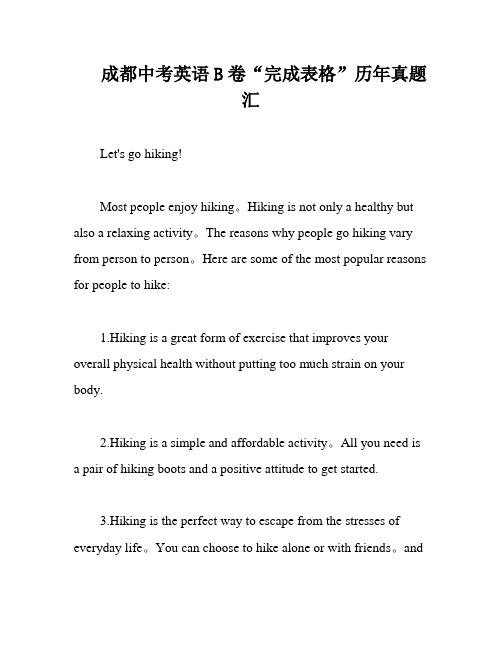
成都中考英语B卷“完成表格”历年真题汇Let's go hiking!Most people enjoy hiking。
Hiking is not only a healthy but also a relaxing activity。
The reasons why people go hiking vary from person to person。
Here are some of the most popular reasons for people to hike:1.Hiking is a great form of exercise that improves your overall physical health without putting too much strain on your body.2.Hiking is a simple and affordable activity。
All you need isa pair of hiking boots and a positive attitude to get started.3.Hiking is the perfect way to escape from the stresses of everyday life。
You can choose to hike alone or with friends。
andafter a day on the trail。
you'll feel refreshed and ready to tackle whatever comes your way.So why not plan your hiking route today?The reasons why hiking is popular are:6.It's a great way to improve your physical health.General reasons for hiking include:7.It's a relaxing and enjoyable activity.Reason 1:Hiking is a low-impact form of exercise that is beneficial for your body without causing unnecessary strain.Reason 2:Hiking is an affordable activity that requires minimal equipment。
2008成都中考英语阅读填表真题含答案

成都中考英语阅读填表题真题训练2008成都B.阅读下面短文,根据短文内容,补全表格中所缺的信息。
请将答案按编号依次填入表格内的题号后横线上。
(共5小题;每小题1分,满分5分)In the past,people used to travel to foreign countries because they thought they would be different in many ways—the buildings,the food,the national dresses and so on.At present,however,one large city is similar to another.They all have their Hilton or Sheraton Hotels everywhere.They all have their McDonald’s.their KFCs and their Pizza Huts.Office buildings look the same everywhere,and most city centers are full of office buildings.And of course,people are driving the same brands (品牌) of Japanese or European cars.Then what is the foreign travel for? What do tourists hope to experience in a foreign country that they cannot experience at home? The answer could be.that people are very interested in the past.It is a nation’s history and culture that are the main attractions.Most people travel overseas to find out what foreign countries history and cultures used to be like。
2008年四川省成都市中考英语试题附参考答案

2008年四川省成都市中考英语试题(满分l 50分,考试时间l 20分钟)A卷(共’l 00分)A卷I(选择题,共90分)第一部分基础知识运用(共50小题,满分50分)一、选择填空(共30小题;每小题l分,满分30分)(A)从各题的A、B、C三个选项中,找出和画线部分意思相同或相近、并能替换画线部分的选项。
(共5小题;每小题l分,满分5分)1. A few minutes later, Paul and Nancy got to Center Street by bus.A. ran toB. arrived atC. went to2. Sam looks strong, but actually he is not in good health.A. in factB. in allC. in general3. I found a supermarket close to my new house.A. in front ofB. far fromC. next to4. After the vacation, all the students returned to the school.A. gave backB. sent backC. went back5. Peter told me he loves China and he wants to travel all over China.A. aroundB. throughC. in’(B)从各题的A、B、C三个选项中选择正确答案。
(共25小题;每小题l分,满分25分)6. —Could you lend me the book you bought last week?A. Yes, here you areB. No, I can't lend it to youC. It's not interesting7. —Tom, shall we set up a student volunteer project in our school?A. I don't want to join youB. Thank you for your helpC. That's a good idea8. —Happy birthday to you, Jack.A. With pleasureB. Thanks a lotC. The same to you9. We all feel_________the disabled girl has made so much progress in music.A. worriedB. lovelyC. surprised10. The funny toy monkey_________Sandy five dollars.A. costB. spentC. used11. —Where is Mike? He asked me to go out for a walk this evening.—Maybe he_________TV in the living room now.A. watchedB. will watchC. is watching12. My friend Dave helped me a lot by giving me_________on English learning.A. advicesB. many adviceC. some advice13. —I haven't seen Bob for a long time. —I haven't seen him,_________.A. tooB. eitherC. instead14. When Mary couldn't see her mother, she began to cry and_________her.A. look forB. look afterC. look at15. —Please give this note to John.—OK, I'll give it to him as soon as he_________.A. is coming backB. will come backC. comes back16. There is_________big square in_________center of our city.A. a; theB. the; aC.the; the17. You_________stay in bed any longer. Get up to work quickly!A. mustB. won'tC. can't18. Alice ran_________Lucy, so she got to the end_________.A. as fast as; earlierB. faster than; earlierC. faster than; the earliest19. —Is this Sam's bike or yours? —It's my bike, not_________.A. yoursB. himC. his20. Julie enjoys listening music very much. She often says to me that_________ismore interesting than music.A. nothingB. somethingC. everything21. In autumn when leaves_________yellow, they soon begin to fall down to the ground.A. keepB. turnC. stay22. There are only_________ new words in the passage, but I know_________ of them.A. some; allB. a few; noneC. lots of; a few23. The lady donated a lot of money_________she is not rich.A. ifB. becauseC. though24. When the school building began to shake, the teachers ran downstairs_________all the students. The teachers are real heroes.A. afterB. withC. before25.—Excuse me, please tell me_________.. —There is a supermarket over there. You can get some there.A. how I can find a supermarketB. where the supermarket isC. where I can buy some fruit26. —You were injured in the accident, weren't you?A. Yes, I wasB. Yes, I wasn'tC. No, I was27. The tour guide_________autumn is the best season to visit Jiuzhaigou.A. talkedB. toldC. said28. Jim, how nice your car is! How long ________you_________it?A. did; buyB. did; haveC. have; had29. Twenty students in this university_________to Australia to study last year, andmore students are expecting to have the chance next year.A. are sentB. were sentC. will send30. All the hats look beautiful. I don't know_________.A. how to chooseB. where to chooseC. which one to choose二、完形填空(共20小题;每小题1分,满分20分)通读下面两篇短文,根据短文内容,从每篇短文后各小题所给的A、B、C三个选项中选出可以填入空白处的最佳答案。
08年九年级英语中考试题(样卷)及答案和听力材料

盐城市二○○八年高中阶段教育招生统一考试英 语 试 题( 样 卷 )第Ⅰ卷 (选择题,共85分)一、 听力(共25小题, 计30分。
其中第1至20小题每题1分,第21至25小题每题2分)A .听下列四个句子,选出与所听句子意思相符的图画,并将其字母标号填入相应题号后的横线上。
每个句子读两遍。
A B C D1.______2._______3._______4.________B.听下面几段对话,每段对话后有几个小题,从题中所给的A 、B 、C 三个选项中选出最佳选项。
每段对话读两遍。
听第1段材料,回答第5-7小题。
5. What holiday is it probably?A. May Day holiday.B. Christmas Day.C. National Day Holiday.6. Where is the boy during the holiday?A. To go to another city.B. To go abroad.C. To stay home.7. What is the boy going to do?A. To travel.B. To study English.C. To do sports.听第2段材料,回答第8-10小题。
8. What colour does the boy like best?A. Orange.B. Green.C. All kinds of colours.9. Why does the girl like orange best?A. It’s the colour of nature.B. It represents growth.C. It can bring her success.10. What is the girl?A. A teacher.B. A student.C. A doctor.听第3段材料,回答第11-13小题。
2008-成都中考英语阅读填表真题(含答案)doc资料
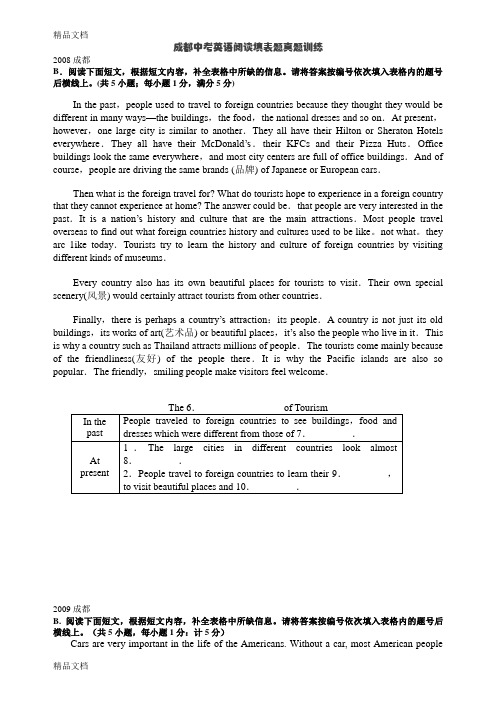
成都中考英语阅读填表题真题训练2008成都B.阅读下面短文,根据短文内容,补全表格中所缺的信息。
请将答案按编号依次填入表格内的题号后横线上。
(共5小题;每小题1分,满分5分)In the past,people used to travel to foreign countries because they thought they would be different in many ways—the buildings,the food,the national dresses and so on.At present,however,one large city is similar to another.They all have their Hilton or Sheraton Hotels everywhere.They all have their McDonald’s.their KFCs and their Pizza Huts.Office buildings look the same everywhere,and most city centers are full of office buildings.And of course,people are driving the same brands (品牌) of Japanese or European cars.Then what is the foreign travel for? What do tourists hope to experience in a foreign country that they cannot experience at home? The answer could be.that people are very interested in the past.It is a nation’s history and culture that are the main attractions.Most people travel overseas to find out what foreign countries history and cultures used to be like。
2014年中考英语阅读完成表格训练
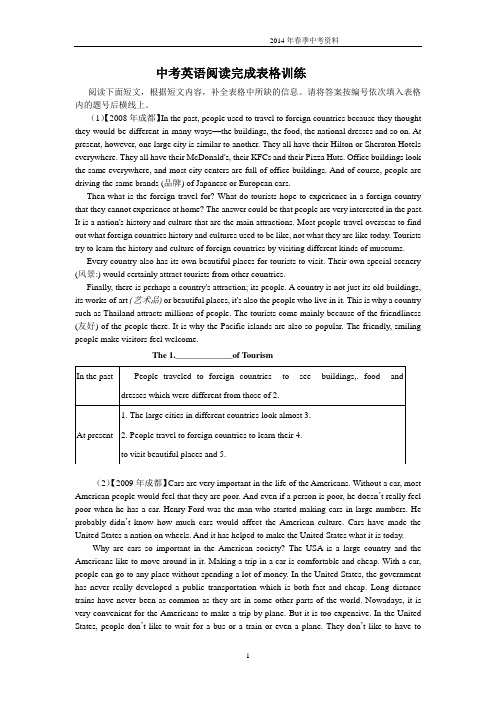
中考英语阅读完成表格训练阅读下面短文,根据短文内容,补全表格中所缺的信息。
请将答案按编号依次填入表格内的题号后横线上。
(2)【2009年成都】Cars are very important in the life of the Americans. Without a car, most American people would feel that they are poor. And even if a person is poor, he doesn’t really feel poor when he has a car. Henry Ford was the man who started making cars in large numbers. He probably didn’t know how much cars would affect the American culture. Cars have made the United States a nation on wheels. And it has helped to make the United States what it is today.Why are cars so important in the American society? The USA is a large country and the Americans like to move around in it. Making a trip in a car is comfortable and cheap. With a car, people can go to any place without spending a lot of money. In the United States, the government has never really developed a public transportation which is both fast and cheap. Long distance trains have never been as common as they are in some other parts of the world. Nowadays, it is very convenient for the Americans to make a trip by plane. But it is too expensive. In the United States, people don’t like to wait for a bus or a train or even a plane. They don’t like to have tofollow an exact timetable (时间表). A car gives them the freedom to plan their own time. And this is the freedom that the Americans want most to have.However, the Americans are also facing a big problem: it is hard to get enough gas (汽油) for cars. But the answer will not be a big system (系统) of public transportation. The real solution will have to be a new kind of car which doesn’t use so much gas.(3)【2010年成都】You may feel curious (好奇) about students in other countries: Do they also have much homework? What do they do in their spare time?On April 8, a report came out on the lives of high school student in China, Japan, South Korea and the US. It surveyed around 6,200 students from the four countries last year. You will find the answers to many of your question in this report.Chinese student spend the most time studying. Nearly half of Chinese student spend more than two hours on their homework every day. That’s much more than students of the US(26.4%), Japan(8.2%) and South Korea(5.2%).Who sleeps most in class?Japanese students fall asleep in class most often. About 45% of then said they sometimes doze off in class. In South Korea, it’s 32%; in the US, 21% sleep in class; and 5% in China.South Korea students don’t like taking notes. About 70% said they write down what the teacher say in class, much fewer than in Japan (93%), china (90%) and the US (89%).Who is the most distracted?American students are the most active in class, but also the most distracted: 64% said they chat with friends in class; 46.9% said they eat snacks in class; and 38.9% said they send e-mails or read unrelated (无关的) books in class.What do they do after class?In their spare time, most Chinese students study or surf the internet. Most American students hang out with their friends. Most Japanese students do physical exercise. Most South Korean students watch TV.(4)【2011年成都】What makes a successful speech? First, you should have a good speechscript (稿子) so that your ideas and language can attract people's attention. And some skills are necessary, too.Here are some suggestions on giving great speeches:◆Beat nervesRelax yourself before and when making a speech. Practice your opening sentence three or four times. This will help make a sure start and a successful speech. When you stand on the stage, think of the audience(观众) as your family members and friends.◆Keep it naturalNatural body languages will help your speech: smile, stand straight and look at the audience. Do not drop your head or play with a pen. Also, dressing yourself nicely will help the audience feel respected.◆Pace and pause (节奏和停顿)Pace and pause add color to your speech. Speak fast enough to keep people excited and slowly enough for people to fully understand you. After an important point, pause for a moment. It'll change the atmosphere (气氛)in the audience.Tips on giving speeches(5)【2012年成都】Some people prefer to make friends with people who are very much like them while others prefer friends who are very different. There are advantages to both types of friendship. If a man chooses a friend similar to himself, there is no problem that they will share man y common interests. They may have similar goals in life. This means that they will be able to help each other in achieving their goals. Two people who are very similar will feel comfortable with each other and may understand each other' s feelings better. Their friendship may be deeper and last longer.There are also many advantages of making friends with someone of opposite interests and even character. In this type of friendship, the two people complement (补充) each other. If one is weak in some ways, the other is strong. While two people with similar goals may find themselves in competition, hut those who wa nt different things can always support each other. Those who have different interests can introduce each other to new experience and so enrich (丰富) their knowledge.2013年中考英语B 卷一、完成对话。
成都市2008年中考试题及答案
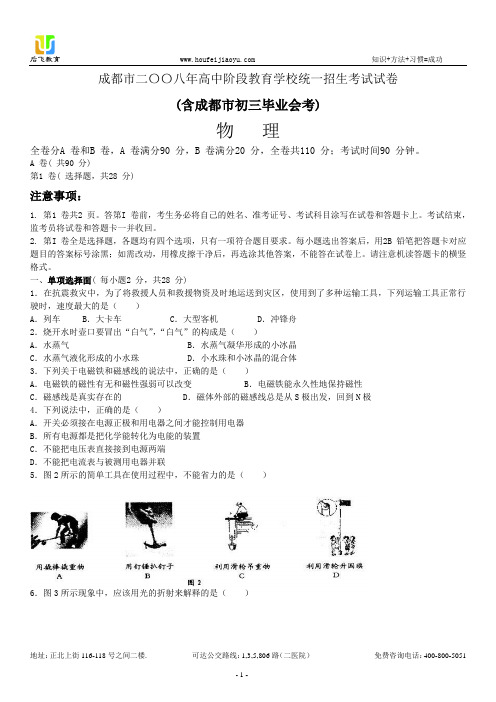
成都市二〇〇八年高中阶段教育学校统一招生考试试卷(含成都市初三毕业会考)物理全卷分A 卷和B 卷,A 卷满分90 分,B 卷满分20 分,全卷共110 分;考试时间90 分钟。
A 卷( 共90 分)第1 卷( 选择题,共28 分)注意事项:1. 第1 卷共2 页。
答第I 卷前,考生务必将自己的姓名、准考证号、考试科目涂写在试卷和答题卡上。
考试结束,监考员将试卷和答题卡一并收回。
2. 第I 卷全是选择题,各题均有四个选项,只有一项符合题目要求。
每小题选出答案后,用2B 铅笔把答题卡对应题目的答案标号涂黑;如需改动,用橡皮擦干净后,再选涂其他答案,不能答在试卷上。
请注意机读答题卡的横竖格式。
一、单项选择面( 每小题2 分,共28 分)1.在抗震救灾中,为了将救援人员和救援物资及时地运送到灾区,使用到了多种运输工具,下列运输工具正常行驶时,速度最大的是()A.列车B.大卡车C.大型客机D.冲锋舟2.烧开水时壶口要冒出“白气”,“白气”的构成是()A.水蒸气B.水蒸气凝华形成的小冰晶C.水蒸气液化形成的小水珠 D.小水珠和小冰晶的混合体3.下列关于电磁铁和磁感线的说法中,正确的是()A.电磁铁的磁性有无和磁性强弱可以改变 B.电磁铁能永久性地保持磁性C.磁感线是真实存在的 D.磁体外部的磁感线总是从S极出发,回到N极4.下列说法中,正确的是()A.开关必须接在电源正极和用电器之间才能控制用电器B.所有电源都是把化学能转化为电能的装置C.不能把电压表直接接到电源两端D.不能把电流表与被测用电器并联5.图2所示的简单工具在使用过程中,不能省力的是()6.图3所示现象中,应该用光的折射来解释的是()7.小王同学分析了四个常见事例中的能量转化,其中正确的是()A.在汽油机的做功冲程中,内能转化为机械能B.电风扇正常工作过程中,电能主要转化为内能C.电热水器工作过程中,内能转化为电能D.跳水运动员在空中下落的过程中,动能转化为重力势能8.对下列常见现象的解释.正确的是()A.物体热胀冷缩,是因为分子的大小随温度的变化而改变B.破镜难圆,是因为分子间有排斥力C.花香四溢,是因为分子在不停地运动D.水往低处流,是因为分子在不停地运动9.半导体材料有着广泛的应用,下列物体中不需要应用半导体材料的是()A.输电线B.手机C.电脑D.电视机10.图4中利用了超声波的是()11.原子结构与下列事物结构最相似的是()A.蛋糕B.面包C.地球D.太阳系12.为控制大气污染,下列措施目前不可行的是()A.尽量用天然气代替煤作城市居民生活用的燃料 B.开发和使用新能源C.改进消烟和除尘装置,提高其性能 D.禁止使用石油资源13.关于现代通信和电磁波,下列叙述正确的是()A.光纤通信传输的信息量很大,主要用于无线电广播B.卫星通信利用人造卫星作为中继站进行通信C.电磁波的应用对人类有利无害D.电磁波不能在真空中传播14.下列数据符合实际的是()A.水的比热容为4.2J/(kg·℃) B.在一个标准大气压下,水的沸点为100℃C.汽油的热值为4.6×l02J/kg D.柴油机的效率可以达到99%二、填空题(每空2分,共32分)15.图5甲、乙中的情景表示了力的作用效果,其中图_______主要表示力能使物体的运动状态发生改变;图_______主要表示力能使物体发生形变。
2008年成都市中考试题英语卷

2008年成都市中考试题英语卷全卷分A卷和B卷,A卷含听力测试。
A卷满分100分,B卷满分50分。
考试时间120分钟。
A卷分A卷I和A卷II,A卷I为选择题,A卷II为其他类型的题。
A卷I答案务必填在答题卡上;A卷II及B卷答案务必全部写在试卷上。
请注意答题卡的横竖格式。
A卷(共100分)A卷I(选择题90分)注意事项:1.A卷I共6页,在答A卷I前,考生务必将自己的姓名、准考证号、考试科目涂写在试卷和答题卡上。
考试结束,监考人员将试卷和答题卡一并收回。
2.每小题选出答案后,用2B铅笔把答题卡对应题目的答案标号涂黑;如需改动,用橡皮擦干净后,再选涂其他答案,不能答在试卷上。
第一部分听力测试(共25小题,计25分)一、听句子,根据所听到的内容选择正确答语。
(共6小题,每小题1分;计6分) 1.A.Y es,I’d like to. B.No,I’m busy. C.Sorry,I don’t know.2.A.Who are you? B.I am Jim.C.Hold on,please.3.A.Please tell me the way.B.It’s across from the hotel.C.Sorry,I’m not a policeman.4.A.Y es,I’d love to.B.Thank you for your great.help.C.Y es.That would be nice.Thank you.5.A.He’s reading a newspaper。
.B.He does some cleaning.C.He’s a bank clerk.6.A.Not at all.B.Y es,please.C.Y es,I do.二、听句子,选择与你所听到的句子内容相符的图片,并将代表图片的字母填在答题卡的相应位置。
(共4小题,每小题1分;计4分)A B C D7 8 9 10三、听对话, 根据对话内容及问题选择正确答案。
2008英语专业八级阅读真题及答案
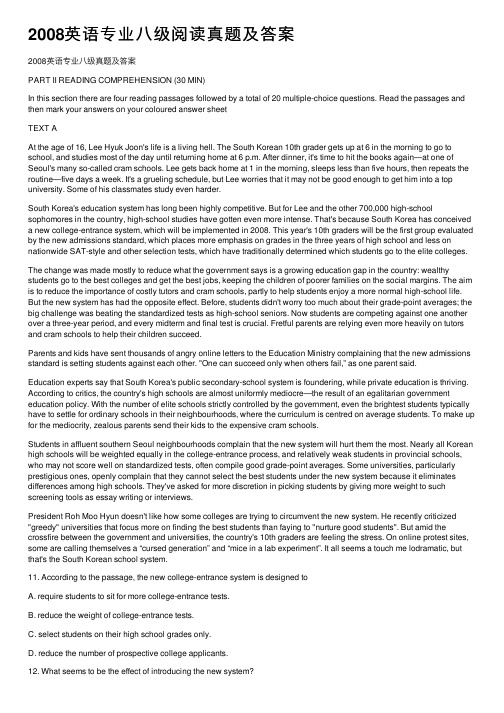
2008英语专业⼋级阅读真题及答案2008英语专业⼋级真题及答案PART II READING COMPREHENSION (30 MIN)In this section there are four reading passages followed by a total of 20 multiple-choice questions. Read the passages and then mark your answers on your coloured answer sheetTEXT AAt the age of 16, Lee Hyuk Joon's life is a living hell. The South Korean 10th grader gets up at 6 in the morning to go to school, and studies most of the day until returning home at 6 p.m. After dinner, it's time to hit the books again—at one of Seoul's many so-called cram schools. Lee gets back home at 1 in the morning, sleeps less than five hours, then repeats the routine—five days a week. It's a grueling schedule, but Lee worries that it may not be good enough to get him into a top university. Some of his classmates study even harder.South Korea's education system has long been highly competitive. But for Lee and the other 700,000 high-school sophomores in the country, high-school studies have gotten even more intense. That's because South Korea has conceived a new college-entrance system, which will be implemented in 2008. This year's 10th graders will be the first group evaluated by the new admissions standard, which places more emphasis on grades in the three years of high school and less on nationwide SAT-style and other selection tests, which have traditionally determined which students go to the elite colleges. The change was made mostly to reduce what the government says is a growing education gap in the country: wealthy students go to the best colleges and get the best jobs, keeping the children of poorer families on the social margins. The aim is to reduce the importance of costly tutors and cram schools, partly to help students enjoy a more normal high-school life. But the new system has had the opposite effect. Before, students didn't worry too much about their grade-point averages; the big challenge was beating the standardized tests as high-school seniors. Now students are competing against one another over a three-year period, and every midterm and final test is crucial. Fretful parents are relying even more heavily on tutors and cram schools to help their children succeed.Parents and kids have sent thousands of angry online letters to the Education Ministry complaining that the new admissions standard is setting students against each other. "One can succeed only when others fail,” as one parent said.Education experts say that South Korea's public secondary-school system is foundering, while private education is thriving. According to critics, the country's high schools are almost uniformly mediocre—the result of an egalitarian government education policy. With the number of elite schools strictly controlled by the government, even the brightest students typically have to settle for ordinary schools in their neighbourhoods, where the curriculum is centred on average students. To make up for the mediocrity, zealous parents send their kids to the expensive cram schools.Students in affluent southern Seoul neighbourhoods complain that the new system will hurt them the most. Nearly all Korean high schools will be weighted equally in the college-entrance process, and relatively weak students in provincial schools, who may not score well on standardized tests, often compile good grade-point averages. Some universities, particularly prestigious ones, openly complain that they cannot select the best students under the new system because it eliminates differences among high schools. They've asked for more discretion in picking students by giving more weight to such screening tools as essay writing or interviews.President Roh Moo Hyun doesn't like how some colleges are trying to circumvent the new system. He recently criticized "greedy" universities that focus more on finding the best students than faying to "nurture good students". But amid the crossfire between the government and universities, the country's 10th graders are feeling the stress. On online protest sites, some are calling themselves a “cursed generation” and “mice in a lab experiment”. It all seems a touch me lodramatic, but that's the South Korean school system.11. According to the passage, the new college-entrance system is designed toA. require students to sit for more college-entrance tests.B. reduce the weight of college-entrance tests.C. select students on their high school grades only.D. reduce the number of prospective college applicants.12. What seems to be the effect of introducing the new system?A. The system has given equal opportunities to students.B. The system has reduced the number of cram schools.C. The system has intensified competition among schools.D. The system has increased students' study load.13. According to critics, the popularity of private education is mainly the result ofA. the government's egalitarian policy.B. insufficient number of schools:C. curriculums of average quality.D. low cost of private education.14. According to the passage, there seems to be disagreement over the adoption of the new system between the following groups EXCEPTA. between universities and the government.B. between school experts and the government.C. between parents and schools.D. between parents and the government.15. Which of the following adjectives best describes the author's treatment of the topic?A. Objective.B. Positive.C. Negative.D. Biased.TEXT BWilfred Emmanuel-Jones was a teenager before he saw his first cow in his first field. Born in Jamaica, the 47-year-old grew up in inner-city Birmingham before making a career as a television producer and launching his own marketing agency. But deep down he always nurtured every true Englishman's dream of a rustic life, a dream that his entrepreneurial wealth has allowed him to satisfy. These days he's the owner of a thriving 12-hectare farm in deepest Devon with cattle, sheep and pigs. His latest business venture: pushing his brand of Black Fanner gourmet sausages and barbecue sauces. “My background may be very urban,” says Emmanuel-Jones. “But it has given me a good idea of what other urbanites want.”And of how to sell it. Emmanuel-Jones joins a herd of wealthy fugitives from city life who are bringing a new commercial know-how to British farming. Britain's burgeoning farmers' markets -numbers have doubled to at least 500 in the last five years—swarm with specialty cheesemakers, beekeepers or organic smallholders who are redeploying the business skills they learned in the city. "Everyone in the rural community has to come to terms with the fact that things have changed." Says Emmanuel-Jones. "You can produce the best food in the world, but if you don't know how to market it, you are wasting your time. We are helping the traditionalists to move on."The emergence of the new class of superpeasants reflects some old yearnings. If the British were the first nation to industrialize, they were also the first to head back to the land. "There is this romantic image of the countryside that is particularly English," says Alun Howkins of the University of Sussex, who reckons the population of rural England has been rising since 1911. Migration into rural areas is now running at about 100,000 a year, and the hunger for a taste of the rural life has kept land prices buoyant even as agricultural incomes tumble. About 40 percent of all farmland is now sold to "lifestyle buyers" rather than the dwindling number of traditional farmers, according to the Royal Institution of Chartered Surveyors. What's new about the latest returnees is their affluence and zeal for the business of producing quality foods, if only at a micro-level. A healthy economy and surging London house prices have helped to ease the escape of the would-be rustics. The media recognize and feed the fantasy. One of the big TV hits of recent years, the "River Cottage" series, chronicled the attempts of a London chef to run his own Dorset farm.Naturally, the newcomers can't hope to match their City salaries, but many are happy to trade any loss of income for the extrajob satisfaction. Who cares if there's no six-figure annual bonus when the land offers other incalculable compensations?Besides, the specialist producers can at least depend on a burgeoning market for their products. Today's eco-aware generation loves to seek out authentic ingredients. "People like me may be making a difference in a small way," Jan McCourt, a onetime investment banker now running his own 40-hectare spread in the English Midlands stocked with rare breeds.Optimists see signs of far-reaching change: Britain isn't catching up with mainland Europe; it's leading the way. “Unlike most other countries, where art isanal food production is being eroded, here it is being recovered," says food writer Matthew Fort.“It may be the mark of the next stage of civilization that we rediscover the desirability of being a peasant.” And not an investment banker.16. Which of the following details of Wilfred Emmanuel-Jones is INCORRECT?A. He was born and brought up in Birmingham.B. He used to work in the television industry.C. He is wealthy, adventurous and aspiring.D. He is now selling his own quality foods.17. Most importantly, people like Wilfred have brought to traditional British farmingA. knowledge of farming.B. knowledge of brand names.C. knowledge of lifestyle.D. knowledge of marketing,18. Which of the following does NOT contribute to the emergence of a new class of farmers?A. Strong desire for country life.B. Longing for greater wealth,C. Influence of TV productions.D. Enthusiasm for quality food business.19. What is seen as their additional source of new income?A. Modern tendency to buy natural foods.B. Increase in the value of land property.C. Raising and selling rare live stock. VD. Publicity as a result of media coverage.20. The sentence in the last paragraph “...Britain isn't catching up with mainland Europe; it's leading the way" implies thatA. Britain has taken a different path to boost economy.B. more authentic foods are being produced in Britain.C. the British are heading back to the countryside.D. the Europeans are showing great interest in country life.TEXT CIn Barcelona the Catalonians call them castells, but these aren't stereotypical castles in Spain. These castles are made up of human beings, not stone. The people who perform this agile feat of acrobatics are called castellers, and to see their towers take shape is to observe a marvel of human cooperation.First the castellers form what looks like a gigantic rugby scrummage. They are the foundation blocks of the castle. Behindthem, other people press together, forming outward-radiating ramparts of inward-pushing muscle: flying buttresses for the castle. Then sturdy but lighter castellers scramble over the backs of those at the bottom and stand, barefoot, on their shoulders—then still others, each time adding a higher "story".These human towers can rise higher than small apar tment buildings: nine “stories”, 35 feet into the air. Then, just When it seems this tower of humanity can't defy gravity any longer, a little kid emerges from the crowd and climbs straight up to the top. Arms extended, the child grins while waving to the cheering crowd far below. Dressed in their traditional costumes, the castellers seem to epitomize an easier time, before Barcelona became a world metropolis arid the Mediterranean's most dynamic city. But when you observe-them tip close, in their street clothes, at practice, you see there's nothing easy about what the castellers do - and that they are not merely reenacting an ancient ritual.None of the castellers can-give a logical answer as to why they love doing this. But Victor Luna, 16, touches me on the shoulder and says in English: "We do it because it's beautiful. We do it because we are Catalan."Barcelona’s mother tongue is Catalan, and to understand Barcelona, you must understand two words of Catalan: seny and rauxa. Seny pretty much translates as common sense, or the ability to make money, arrange things, and get things done. Rauxa is reminiscent of our words “raucous” and “ruckus”.What makes the castellers revealing of the city is that they embody rauxa and seny. The idea of a human castle is rauxa—it defies common sense—but to watch one going up is to see seny in action. Success is based on everyone working together to achieve a shared goal.The success of Carlos Tusquets' bank, Fibanc, shows seny at work in everyday life. The bank started as a family concern and now employs hundreds. Tusquets said it exemplifies how the economy in Barcelona is different.Entrepreneurial seny demonstrates why Barcelona and Catalonia—the ancient region of which Barcelona is the capital—are distinct from the rest of Spain yet essential to Spain's emergence, after centuries of repression, as a prosperous, democratic European country. Catalonia, with Barcelona as its dynamo, has turned into an economic powerhouse. Making up 6 percent of Spain’s territory, with a sixth of its people, it accounts for nearly a quarter of Spain's production—everything fromtextiles to computers—even though the rest of Spain has been enjoying its own economic miracle.Hand in hand with seny goes rauxa, and there's no better place to see rauxa in action than on the Ramblas, the venerable, tree-shaded boulevard that, in gentle stages, leads you from the centre of Barcelona down to the port. There are two narrow lanes each way for cars and motorbikes, but it’s the wide centre walkway that makes the Ramblas a front-row seat for Barcelona's longest running theatrical event. Plastic armchairs are set out on the sidewalk. Sit in one of them, and an attendant will come and charge you a small fee. Performance artists throng the Ramblas—stilt walkers, witches caked in charcoal dust, Elvis impersonators. But the real stars are the old women and happily playing children, millionaires on motorbikes, and pimps and women who, upon closer inspection, prove not to be.Aficionados (Fans) of Barcelona love to co mpare notes: “Last night there was a man standing on the balcony of his hotel room,” Mariana Bertagnolli, an Italian photographer, told me. "The balcony was on the second floor. He was naked, and he was talking into a cell phone."There you have it, Barcelona's essence. The man is naked (rauxa), but he is talking into a cell phone (seny).21. From the description in the passage, we learn thatA. all Catalonians can perform castells.B. castells require performers to stand on each other.C. people perform castells in different formations.D. in castells people have to push and pull each other.22. According to the passage, the4mplication of the performance is thatA. the Catalonians are insensible and noisy people.B. the Catalonians show more sense than is expected.C. the Catalonians display paradoxical characteristics.D. the Catalonians think highly of team work.23. The passage cites the following examples EXCEPT __________ to show seny at work.A. development of a bankB. dynamic role in economyC. contribution to national economyD. comparison with other regions24. In the last but two paragraph, the Ramblas is described as “a front-row seat for Barcelona’s longest running theatrical event”. What does it mean?A. On the Ramblas people can see a greater variety of performances.B. The Ramblas provides many front seats for the performances.C. The Ramblas is preferred as an important venue for the events.D. Theatrical performers like to perform on the Ramblas.25. What is the main impression of the scenes on the Ramblas?A. It is bizarre and Outlandish.B. It is of average quality.C. It is conventional and quiet.D. It is of professional standard.TEXT DThe law firm Patrick worked for before he died filed for bankruptcy protection a year after his funeral. After his death, the firm's letterhead properly included him: Patrick S. Lanigan, 1954-1992. He was listed up in the right-hand corner, just above the paralegals. Then the rumors got started and wouldn't stop. Before long, everyone believed he had taken the money and disappeared. After three months, no one on the Gulf Coast believed that he was dead. His name came off the letterhead as the debts piled up.The remaining partners in the law firm were still together, attached unwillingly at the hip by the bondage of mortgages and the bank notes, back when they were rolling and on the verge of serious wealth. They had been joint defendants in several unwinnable lawsuits; thus the bankruptcy. Since Patrick's departure, they had tried every possible way to divorce one another, but nothing would work. Two were raging alcoholics who drank at the office behind locked doors, but nevertogether. The other two were in recovery, still teetering on the brink of sobriety.He took their money. Their millions. Money they had already spent long before it arrived, as only lawyers can do. Money for their richly renovated office building in downtown Biloxi. Money for new homes, yachts, condos in the Caribbean. The money was on the way, approved, the papers signed, orders entered; they could see it, almost touch it when their dead partner—Patrick—snatched it at the last possible second.He was dead. They buried him on February 11, 1992. They had consoled the widow and put his rotten name on their handsome letterhead. Yet six weeks later, he somehow stole their money.They had brawled over who was to blame. Charles Bogan, the firm's senior partner and its iron hand, had insisted the money be wired from its source into a new account offshore, and this made sense after some discussion. It was ninety million bucks, a third of which the firm would keep, and it would be impossible to hide that kind of money in Biloxi, population fifty thousand. Someone at the bank would talk. Soon everyone would know. All four vowed secrecy, even as they made plans to display as much of their new wealth as possible. There had even been talk of a firm jet, a six-seater.So Bogan took his share of the blame. At forty-nine, he was the oldest of the four, and, at the moment, the most stable. He was also responsible for hiring Patrick nine years earlier, and for this he had received no small amount of grief.Doug Vitrano, the litigator, had made the fateful decision to recommend Patrick as the fifth partner. The other three had agreed, and when Patrick Lanigan was added to the firm name, he had access to virtually every file in the office. Bogan, Rapley, Vitrano, Havarac, and Lanigan, Attorneys and Counselors-at-Law. A large ad in the yellow pages claimed "Specialists in Offshore Injuries." Specialists or not, like most firms they would take almost anything if the fees were lucrative. Lots of secretaries and paralegals. Big overhead, and the strongest political connections on the Coast.They were all in their mid- to late forties. Havarac had been raised by his father on a shrimp boat. His hands were still proudlycalloused, and he dreamed of choking Patrick until his neck snapped. Rapley was severely depressed and seldom left his home, where he wrote briefs in a dark office in the attic.26. What happened to the four remaining lawyers after Patrick's disappearance?A. They all wanted to divorce their wives.B. They were all heavily involved in debts.C. They were all recovering from drinking.D. They had bought new homes, yachts, etc.27. Which of the following statements contains a metaphor?A. His name came off the letterhead as the debts piled up.B. …they could see it, almost touch it when their dead partner...C. …, attached unwillingly at the hip by the bondage of mortgages...D. …, and for this he had received no small amount of grief.28. According to the passage, what is the main cause of Patrick stealing the money?A. Patrick was made a partner of the firm.B. The partners agreed to have the money transferred.C. Patrick had access to all the files in the firm.D. Bogan decided to hire Patrick nine years earlier.29. The lawyers were described as being all the following EXCEPTA. greedy.B. extravagantC. quarrelsome.D. bad-tempered.30. Which of the following implies a contrast?A. …, and it would be impossible to hide that kind of money in Biloxi, population fifty thousand.B. They had been joint defendants in several unwinnable lawsuits; thus the bankruptcy.C. There had even been talk of a firm jet, a six-seater.D. His name came off the letterhead as the debts piled up.2008年英语专业⼋级Mini-lecture:(沪友今⼼提供)1. native language2. 3503. Historical4. India5. commerce6. Boom7. sea travel communication8. conference9. many radios 10. split阅读:(沪友落落提供)阅读⼀共四篇:韩国的新教育制度引起多⽅不满;第⼆篇是讲西班⽛⼈的⼀些性格;第三篇是英国⼈热衷⾃⼰饲养出售畜牧产品;最后⼀篇是⼀个⼩说节选,四个律师被死去的合伙⼈骗得破产。
2008四川高考英语真题(附答案)
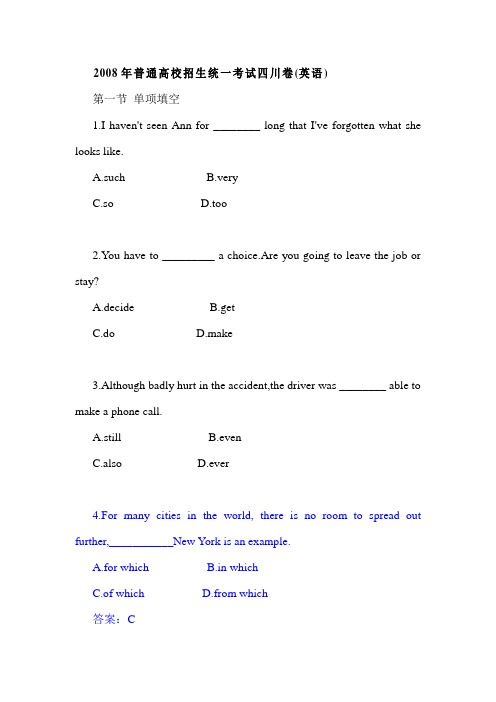
2008年普通高校招生统一考试四川卷(英语)第一节单项填空1.I haven't seen Ann for ________ long that I've forgotten what she looks like.A.suchB.veryC.soD.too2.You have to _________ a choice.Are you going to leave the job or stay?A.decideB.getC.doD.make3.Although badly hurt in the accident,the driver was ________ able to make a phone call.A.stillB.evenC.alsoD.ever4.For many cities in the world, there is no room to spread out further,___________New York is an example.A.for whichB.in whichC.of whichD.from which答案:C5.-Let's go for a walk in the garden.-___________,but I need to do the washing-up.A.No,thank youB.That's rightC.Good ideaD.Not at all6.There were some chairs left over _________ everyone had sat down.A.whenB.untilC.thatD.where答案:A译文:每人都坐下了以后,还有一些椅子空着。
when 引导的时间状语从句中的动词可以为延续性动词也可以是非延续性动词,可用于主句动作与从句动作同时发生或从句动作先于主句动作发生。
2008年成都市中考英语试题
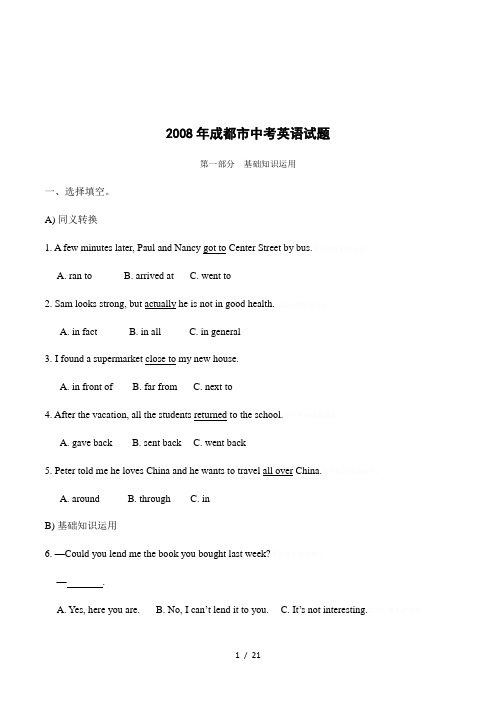
2008 年成都市中考英语试题第一部分 基础知识运用一、选择填空。
A) 同义转换 1. A few minutes later, Paul and Nancy got to Center Street by bus.矚慫润厲钐瘗睞枥。
A. ran to B. arrived at C. went to2. Sam looks strong, but actually he is not in good health.聞創沟燴鐺險爱氇。
A. in fact B. in all C. in general3. I found a supermarket close to my new house. A. in front of B. far from C. next to4. After the vacation, all the students returned to the school.残骛楼諍锩瀨濟溆。
A. gave back B. sent back C. went back5. Peter told me he loves China and he wants to travel all over China.酽锕极額閉镇桧猪。
A. around B) 基础知识运用 6. —Could you lend me the book you bought last week?彈贸摄尔霁毙攬砖。
— . B. No, I can’t lend it to you. C. It’s not interesting.謀荞抟箧飆鐸怼类。
B. through C. inA. Yes, here you are.1 / 217. —Tom, shall we set up a student volunteer project in our school?厦礴恳蹒骈時盡继。
— .A. I don’t want to join you. B. Thank you for your help. C. That’s a good idea.茕桢广鳓鯡选块网。
成都市2008年高中阶段教育学校统一招生考试

成都市2008年高中阶段教育学校统一招生考试英语(满分150分,考试时间120分钟)A卷(共100分)A卷第I卷(选择题,共90分)第一部分基础知识运用(共50小题,满分50分)一、选择填空(共30小题;每小题1分,满分30分)(A)从各题的A、B、C三个选项中,找出和画线部分意思相同或相近、并能替换画线部分的选项。
(共5小题;每小题1分,满分5分)1.A few minutes later,Paul and Nancy got to Center Street by bus.A.ran to B.arrived at C.went to2.Sam looks strong,but actually he is not in good health.A.in fact B.in all C.in general3.I found a supermarket close to my new house.A.in front of B.far from C.next to4.After the vacation,all the students returned to the school.A.gave back B.sent back C.went back5.Peter told me he loves China and he wants to travel all over China.A.around B.through C.in(B)从各题的A、B、C三个选项中选择正确答案。
(共25小题;每小题1分,满分25分)6.—Could you lend me the book you bought last week?—__________.A.Y es,here you are B.No,I can’t lend it to you C.It’s not interesting7.—Tom,shall we set up a student volunteer project in our school?—__________.A.I don’t want to join youB.Thank you for your helpC.That’s a good idea8.—Happy birthday to you,Jack.—________.A.With pleasure B.Thanks a lot C.The same to you9.We all feel ________ the disabled girl has made so much progress in music.A.worried B.lovely C.surprised10.The funny toy monkey ________ Sandy five dollars.A.cost B.spent C.used11.—Where is Mike? He asked me to go out for a walk this evening.—Maybe he ________ TV in the living room now.A.watched B.will watch C.is watching12.My friend Dave helped me a lot by giving me ________ on English learning.A.advices B.many advice C.some advice13.—I haven’t seen Bob for a long time.—I haven’t seen him,________.A.too B.either C.instead14.When Mary couldn’t see her mother,she began to cry and ________ her.A.look for B.look after C.look at15.—Please give this note to John.—OK,I’ll give it to him as soon as he ________.A.is coming back B.will come back C.comes back16.There is ________ big square in ________ center of our city.A.a;the B.the;a C.the;the17.Y ou ________ stay in bed any longer.Get up to work quickly!A.must B.won’t C.can’t18.Alice ran Lucy。
2008四川阅读
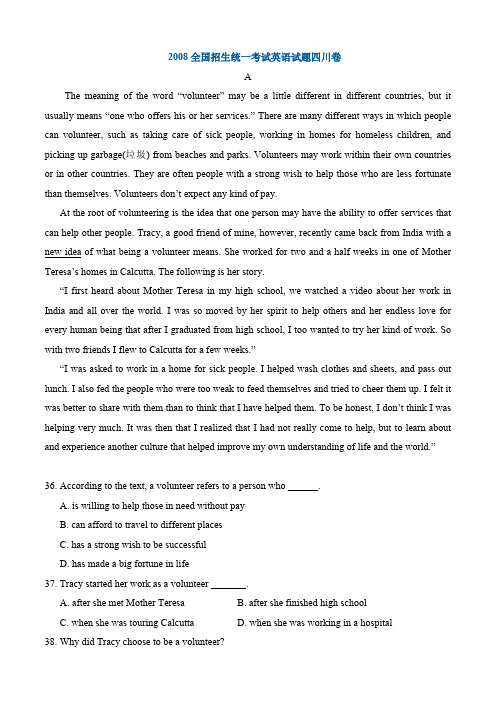
2008全国招生统一考试英语试题四川卷AThe meaning of the word “volunteer” may be a little different in different countries, but it usually means “one who offers his or her services.” There are many different ways in which people can volunteer, such as taking care of sick people, working in homes for homeless children, and picking up garbage(垃圾) from beaches and parks. Volunteers may work within their own countries or in other countries. They are often people with a strong wish to help those who are less fortunate than themselves. Volunteers don’t expect any kind of pay.At the root of volunteering is the idea that one person may have the ability to offer services that can help other people. Tracy, a good friend of mine, however, recently came back from India with a new idea of what being a volunteer means. She worked for two and a half weeks in one of Mother Teresa’s homes in Calcutta. The following is her story.“I first heard about Mother Teresa in my high school, we watched a video about her work in India and all over the world. I was so moved by her spirit to help others and her endless love for every human being that after I graduated from high school, I too wanted to try her kind of work. So with two friends I flew to Calcutta for a few weeks.”“I was asked to work in a home for sick people. I helped wash clothes and sheets, and pass out lunch. I also fed the people who were too weak to feed themselves and tried to cheer them up. I felt it was better to share with them than to think that I have helped them. To be honest, I don’t think I was helping very much. It was then that I realized that I had not really come to help, but to learn about and experience another culture that helped improve my own understanding of life and the world.”36. According to the text, a volunteer refers to a person who ______.A. is willing to help those in need without payB. can afford to travel to different placesC. has a strong wish to be successfulD. has made a big fortune in life37. Tracy started her work as a volunteer _______.A. after she met Mother TeresaB. after she finished high schoolC. when she was touring CalcuttaD. when she was working in a hospital38. Why did Tracy choose to be a volunteer?A. She liked to work with Mother Teresa.B. She had already had some experience.C. She was asked by Mother Teresa to do so.D. She wanted to follow Mother Teresa’s example.39. What is Tracy’s “new idea” (Paragraph 2) of being a volunteer?A. Going abroad to help the sick.B. Working in Mother Teresa’s home.C. Doing simple things to help the poor.D. Improving oneself through helping others.BAs nanny(保姆), cook, cleaner, shopper, driver, and gardener, she has one of the most demanding jobs in Britain today. And paying someone else to do the chores(家务活) which take the average housewife 71 hours a week would cost €349.At over €18,000 a year that’s more than the earnings of 70 percent of the population, including train drivers, firemen, prison officers, and social worker. Looking after a baby less than a year old takes a housewife into an even higher pay league. According to a study, she earns €457 a week – at nearly €24,000 a year, the same as teachers, engineers, and chemists.Researchers put a price on each chore, then tried to find out how long the average person takes doing them. They found housewives spend an average 70.7 hours a week on housework – with looking after the children (17.9 hours) and cooking and cleaning (12.3 hours each) the most time-consuming(费时).A wife with a part-time job still works an average of 59 hours a week at home. Those in full-time employment put in longer hours at home than in the workplace. The good news is that these hours drop sharply as children get older. While the average mother with a child under one puts in 90 hours weekly, the figure drops to 80 hours from one to four and to 66 hours from five to ten.Mother-of-four Karen Williams from London said, “Paying the housewives may not be practical, but the government should recognize the value of housework, perhaps through the tax. Running a house takes a lot of time and most husbands don’t understand this. For example, my husband only puts a shelf up now and again. He never cleans the kitchen – that’s the real test.”40. Who earns most according to the text?A. A social worker.B. A fireman.C. A gardener.D. A teacher.41. We learn from the text that looking after children ______.A. takes more time than doing any other houseworkB. means more duties than being a teacherC. requires the mother to be well-educatedD. prevents the mother from working outside42. According to the text, a housewife with a baby less than one year old may work ______.A. 66 hours a weekB. 71 hours a weekC. 80 hours a weekD. 90 hours a week43. By mentioning her husband, Karen Williams wants to show that ______.A. housework is no easy jobB. her husband has no time to clean the kitchenC. a housewife needs to be paid for cleaningD. the kitchen is hard to cleanCAre you sometimes a little tired and sleepy in the early afternoon? Many people feel this way after lunch. They may think that eating lunch is the cause of the sleepiness. Or, in summer, they may think it is the heat. However, the real reason lies inside their bodies. At that time – about eight hours after you wake up – your body temperature goes down. This is what makes you slow down and feel sleepy. Scientists have tested sleep habits in experiments where there was no night or day. The people in these experiments almost always followed a similar sleeping pattern. They slept for one long period and then for one short period about eight hours later.In many parts of the world, people take naps(小睡) in the middle of the day. This is especially true in warmer climates(气候), where the heat makes work difficult in the early afternoon. Researchers are now saying that naps are good for everyone in any climate. A daily nap gives one a more rested body and mind and therefore is good for health in general. In countries where naps are traditional, people often suffer less from problems such as heart disease.Many working people, unfortunately, have no time to take naps. Though doctors may advise taking naps, employers do not allow it! If you do have the chance, however, here are a few tips aboutmaking the most of your nap. Remember that the best time to take a nap is about eight hours after you get up. A short sleep too late in the day may only make you feel more tired and sleepy afterward. This can also happen if you sleep for too long. If you do not have enough time, try a short nap – even ten minutes of sleep can be helpful.44. Why do people feel sleepy in the early afternoon according to the text?A. They eat too much for lunch.B. They sleep too little at night.C. Their body temperature becomes lower.D. The weather becomes a lot warmer.45. If you get up at 6:30 am, what is the best time for you to take a nap?A. About 12:30 pm.B. About 1:30 pm.C. About 2:30 pmD. About 3:30 pm46. What would be the best title for the text?A. Just for a RestB. All for a NapC. A Special Sleep Pattern.D. Taking Naps in Warmer Climate.DFive million people visit Grand Canyon in the US every year. For the purpose of helping protect Grand Canyon for your fellow visitors and future generations, please follow the guidelines below. CampingTo protect the park, camping is allowed only within permitted campgrounds. Permits are required for overnight camping at the North Rim. Advance booking can be received by mail. Please write: Information Center, P.O. Box 129, Grand Canyon, AZ 86023FiresBecause of the extreme fire danger, campfires are not allowed except at Mather and Desert View campgrounds. Collection of firewood is not allowed either.Hiking(远足)Please stay on permitted paths. Otherwise you may destroy desert plants. Pack out what you pack in, so you leave no signs of your visit. It is important to keep in mind that you are in a national park where wildlife exists.WeatherThe weather at Grand Canyon can change very quickly. With so much rock, lightning(闪电) causes a particular danger during sudden summer storms. These storms also frequently bring floods inside valleys, a danger to hikers. Watch the skies and check daily weather reports.WildlifeDo not feed park wildlife. There have been a few cases at Grand Canyon National Park where deer were purposely shot because they ate plastic bags that left them sick and weak. Hungry deer can be a danger and have kicked and bitten visitors at Grand Canyon. Some other animals will also beg and bite. For your own safety and the well-being of the animals, please do not feed wildlife, no matter how gentle they may appear.47. What can you do first if you want to go camping?A. Know the permitted paths.B. Book campgrounds in advance.C. Make sure not to make a fireD. Stop at Mather and Desert View.48. What do the underlined words “pack out what you pack in” in Paragraph 4 probably mean?A. keep everything out of campgroundsB. take away everything you bring inC. carry all the necessary foodD. look after your personal belongings49. Why were some deer killed on purpose at Grand Canyon?A. They ate wrong things and became very ill.B. They were a danger to other gentle animals.C. They begged food from visitors.D. They kicked and bit visitors.50. What is the main purpose of the text?A. To provide travel informationB. To report some recent news.C. To teach tourists hiking skillsD. To introduce the wild lifeEAt a certain time in our lives we consider every place as the possible site (地点) for a house. I have thus searched the country within a dozen miles of where I live. In imagination I have bought all the farms, one after another, and I knew their prices.The nearest thing that I came to actual ownership was when I bought the Hollowell place. But before the owner completed the sale with me, his wife changed her mind and wished to keep it, andhe offered me additional dollars to return the farm to him. However, I let him keep the additional dollars and sold him the farm for just what I gave for it.The real attractions of the Hollowell farm to me were its position, being about two miles from the village, half a mile from the nearest neighbor, bounded(相邻) on one side by the river, and separated from the highway by a wide field. The poor condition of the house and fences showed that it hadn’t been used for some time. I remembered from my earliest trip up the river that the house used to be hidden behind a forest area, and I was in a hurry to buy it before the owner finished getting out some rocks, cutting down the apples trees, and clearing away some young trees which had grown up in the fields. I wanted to buy it before he made any more of his improvements. But it turned out as I have said.I was not really troubled by the loss. I had always had a garden, but I don’t think I was ready fora large farm. I believe that as long as possible it is better to live free and uncommitted (无牵挂的). It makes but little difference whether you own a farm or not.51. What do we know about the author?A. He wanted to buy the oldest farm near where he lived.B. He made a study of many farms before buying.C. He made money by buying and selling farms.D. He had the money to buy the best farm in the country.52. Why did the author decide to buy the Hollowell place?A. It was of good market value.B. It was next to the highway.C. It was in a good position.D. It was behind a nice garden.53. Why did the author want to buy the farm in a hurry?A. He was afraid the owner might change his mind.B. He hoped to enlarge the forest on the farm.C. He wanted to keep the farm as it was.D. He was eager to become a farm owner.54. The underlined words “the loss” in the last paragraph refer to ______.A. the money the author lost in buying the farmB. the sale of the garden in the Hollowell placeC. the removal of the trees around the houseD. the failure to possess the Hollowell place55. What does the author believe as important in life?A. To own a farmB. To satisfy his needsC. To be free from worriesD. To live in the countryside36. A 37. B 38. D 39. D 40. D 41. A 42. D 43. A 44. C 45. C 46. B 47. B 48. B 49. A 50. A 51. B 52. C 53.C 54. D 55.C。
四川省成都市2008届高中毕业班第二次诊断性检测英语题
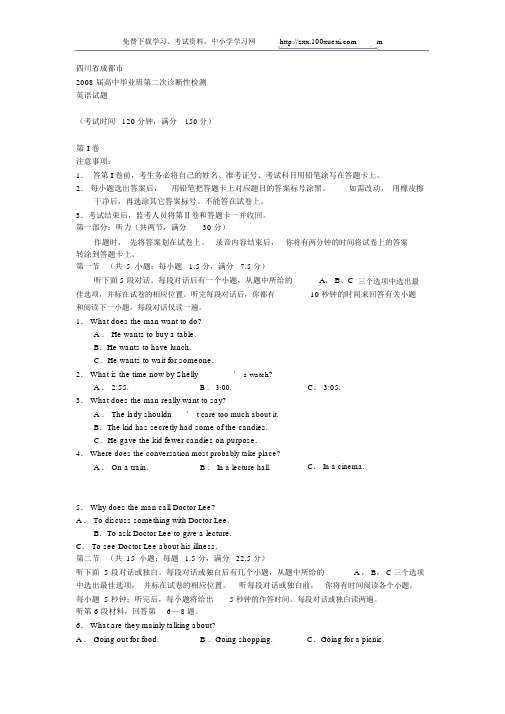
免费下载学习、考试资料,中小学学习网 m四川省成都市2008 届高中毕业班第二次诊断性检测英语试题(考试时间120 分钟,满分150 分)第I 卷注意事项:1.答第 I 卷前,考生务必将自己的姓名、准考证号、考试科目用铅笔涂写在答题卡上。
2.每小题选出答案后,用铅笔把答题卡上对应题目的答案标号涂黑。
如需改动,用橡皮擦干净后,再选涂其它答案标号。
不能答在试卷上。
3.考试结束后,监考人员将第Ⅱ卷和答题卡一并收回。
第一部分:听力(共两节,满分30 分)作题时,先将答案划在试卷上。
录音内容结束后,你将有两分钟的时间将试卷上的答案转涂到答题卡上。
第一节(共5小题;每小题 1.5 分,满分7.5 分)听下面 5 段对话。
每段对话后有一个小题,从题中所给的A、 B、C三个选项中选出最佳选项,并标在试卷的相应位置。
听完每段对话后,你都有10 秒钟的时间来回答有关小题和阅读下一小题。
每段对话仅读一遍。
1. What does the man want to do?A . He wants to buy a table.B.He wants to have lunch.C.He wants to wait for someone.2. What is the time now by Shelly’ s watch?A . 2:55.B . 3:00.3. What does the man really want to say?A . The lady shouldn’ t care too much about it.B.The kid has secretly had some of the candies.C.He gave the kid fewer candies on purpose.4. Where does the conversation most probably take place?A . On a train.B . In a lecture hall.C. 3:05. C. In a cinema.5. Why does the man call Doctor Lee?A . To discuss something with Doctor Lee.B.To ask Doctor Lee to give a lecture.C. To see Doctor Lee about his illness.第二节(共15小题;每题 1.5 分,满分22.5 分)听下面 5 段对话或独白。
- 1、下载文档前请自行甄别文档内容的完整性,平台不提供额外的编辑、内容补充、找答案等附加服务。
- 2、"仅部分预览"的文档,不可在线预览部分如存在完整性等问题,可反馈申请退款(可完整预览的文档不适用该条件!)。
- 3、如文档侵犯您的权益,请联系客服反馈,我们会尽快为您处理(人工客服工作时间:9:00-18:30)。
成都中考英语阅读填表题真题训练2008成都B.阅读下面短文,根据短文内容,补全表格中所缺的信息。
请将答案按编号依次填入表格内的题号后横线上。
(共5小题;每小题1分,满分5分)In the past,people used to travel to foreign countries because they thought they would be different in many ways—the buildings,the food,the national dresses and so on.At present,however,one large city is similar to another.They all have their Hilton or Sheraton Hotels everywhere.They all have their McDonald’s.their KFCs and their Pizza Huts.Office buildings look the same everywhere,and most city centers are full of office buildings.And of course,people are driving the same brands (品牌) of Japanese or European cars.Then what is the foreign travel for? What do tourists hope to experience in a foreign country that they cannot experience at home? The answer could be.that people are very interested in the past.It is a nation’s history and culture that are the main attractions.Most people travel overseas to find out what foreign countries history and cultures used to be like。
not what。
they arc 1ike today.Tourists try to learn the history and culture of foreign countries by visiting different kinds of museums.Every country also has its own beautiful places for tourists to visit.Their own special scenery(风景) would certainly attract tourists from other countries.Finally,there is perhaps a country’s attraction:its people.A country is not just its old buildings,its works of art(艺术品) or beautiful places,it’s also the people who live in it.This is why a country such as Thailand attracts millions of people.The tourists come mainly because of the friendliness(友好) of the people there.It is why the Pacific islands are also so popular.The friendly,smiling people make visitors feel welcome.2009成都B. 阅读下面短文,根据短文内容,补全表格中所缺信息。
请将答案按编号依次填入表格内的题号后横线上。
(共5小题,每小题1分:计5分)Cars are very important in the life of the Americans. Without a car, most American people would feel that they are poor. And even if a person is poor, he doesn’t really feel poor when hehas a car. Henry Ford was the man who started making cars in large numbers. He probably didn’t know how much cars would affect the American culture. Cars have made the United States a nation on wheels. And it has helped to make the United States what it is today.Why are cars so important in the American society? The USA is a large country and the Americans like to move around in it. Making a trip in a car is comfortable and cheap. With a car people can go to any place without spending a lot of money. In the United States, the government has never really developed a public transportation which is both fast and cheap. Long distance trains have never been as common as they are in some other parts of the world. Nowadays, it is very convenient for the Americans to make a trip by plane. But it is too expensive. In the United States, people don’t like to wait for a bus, or a train or even a plane. They don’t like to have to follow an exact timetable (时间表). A car gives them the freedom to plan their own time. And this is the freedom that the Americans want most to have.However, the Americans are also facing a big problem; it is hard to get gas (汽油) for cars. But the answer will not be a big system (系统) of public transportation. The real solution will have to be a new kind of car which doesn’t use so much gas.2010成都B)阅读下面课文,根据其内容,完成表格中所缺的信息。
将答案标号一次填入内的题号后(共5小题,每题1分;计5分。
)You may feel curious (好奇) about students in other countries: Do they also have muc h homework? What do they do in their spare time?On April 8, a report came out on the lives of high school student in China, Japan, South Korea and the US. It surveyed around 6,200 students from the four countries last year. You will find the answers to many of your question in this report.Chinese student spend the most time studying. Nearly half of Chinese student spend more than two hours on their homework every day. That’s much more than students of the US(26.4%), Japan(8.2%) and South Korea(5.2%).Who sleeps most in class?Japanese students fall asleep in class most often. About 45% of then said they sometimes doze off in class. In South Korea, it’s 32%; in the US, 21% sleep in class; and 5% in China.South Korea students don’t like taking notes. About 70% said they write down what the teach er say in class, much fewer than in Japan (93%), china (90%) and the US (89%).Who is the most distracted?American students are the most active in class, but also the most distracted: 64% said they chat with friends in class; 46.9% said they eat snacks in class; and 38.9% said they send e-mails or read unrelated (无关的) books in class.What do they do after class?In their spare time, most Chinese students study or surf the internet. Most American students hang out with their friends. Most Japanese students do physical exercise. Most South Korean students watch TV.2011成都B. 阅读下面短文,根据其内容,完成表格中所缺的信息。
